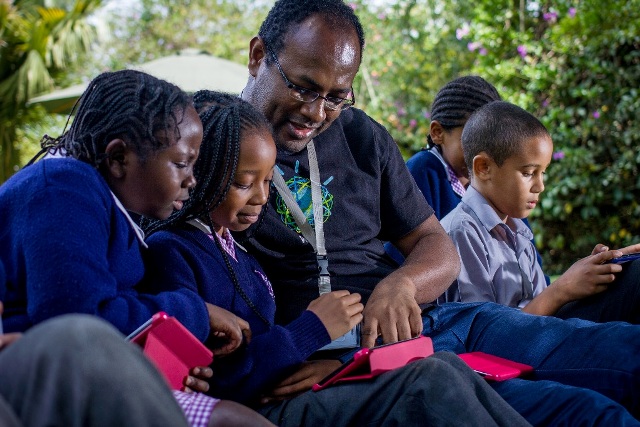
IBM Research Scientist, Dr Kommy Weldemariam with pupils from Riara School, Nairobi exploring how technology can help improve educational outcomes
RTI International and IBM Africa research lab have announced a partnership to deploy big data analytics and cognitive technologies starting with schools in Mombasa County, Kenya.
Through the partnership, RTI (a non-profit research organisation) and IBM Research – Africa are developing and testing intelligent systems to capture data about schools in the county to help transform education development approaches in Africa and around the world. In one of the first projects, IBM and RTI are developing and testing intelligent systems to capture data about schools in Mombasa County, Kenya.
Drawing on the power of big data analytics, researchers will provide insight to governments, aid agencies and other organizations who are looking to make more informed decisions about investment and development while having greater visibility of results.
“A dearth of data on Africa in the past has led to misunderstandings or misrepresentations of the continent’s history, economic performance and potential. Over the past few decades, even simple facts have been misrepresented – the size of a country, its economic performance, the amount of poor people, the volume of exploitable resources,” said Dr. Kamal Bhattacharya, Vice President IBM Research – Africa.
The partnership comes as a rapid rise in mobile and Internet of Things technologies are producing unprecedented amounts of data. In developing countries, mobile phones, digital devices and low-cost sensors connected to improving cellular networks are reaching previously disconnected communities with the potential to produce new insight about how people live and the challenges they face.
Big Data for Education in Mombasa County
In one of the first joint projects, RTI and IBM are developing and testing intelligent systems for data capture and decision support to improve accountability and transparency in more than 100 schools in Mombasa County, Kenya. The project is designed to support the Kenyan Ministry of Education Science and Technology data collection initiative.
Teachers, head teachers, school principals and administrators will be equipped with tablet devices to capture data about students, classrooms, and school resources. IBM and RTI scientists will use big data analytics and cognitive technologies to analyze the data and provide indicators that establish school profiles and progress and provide actionable recommendations about the county’s education system at a granular level. The activity is part of the United States Agency for International Development’s Education Data for Decision Making (EdData II) project.
“In the past, head teachers, government officials and aid agencies across Sub-Saharan Africa have struggled to make informed decisions about how to invest in and improve education,” said Dr. Kommy Weldemariam, Research Scientist, IBM Research – Africa.
“Often education data is incomplete, inaccurate and sometimes even deliberately misreported. Using analytics and cognitive technologies, we are creating a school census hub which will minimize the effort, expense and error in collecting valuable data about attendance, performance and resources at schools. It has the potential to completely change our understanding of the situation on the ground and what needs to be done to improve it and improve the outcomes for children,” adds Weldemariam.
In the education sector, such initiatives can provide insight on building early childhood development programs that predicate success in later education and life; design early grade reading and math programs using the best instructional approaches and curricula; and inform policymakers on policies needed to support sustainable improvements in education and the data systems needed to track progress in systemic reform.



































